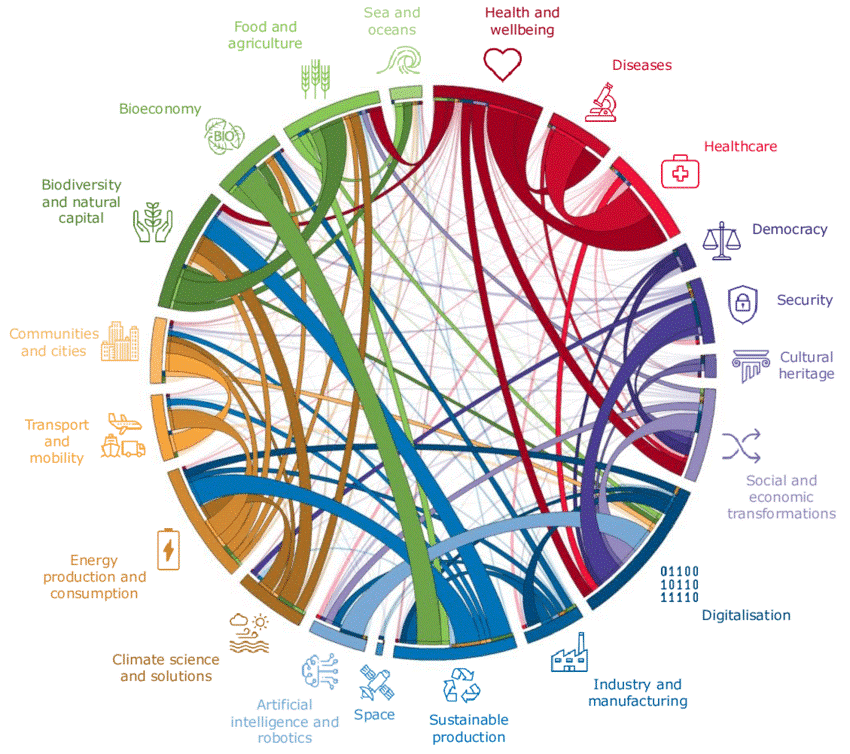
21 Apr WORLD CREATIVITY AND INNOVATION DAY: THE EU COMMITS TO SUSTAINABLE DEVELOPMENT
Innovation, in general terms, can be described as the practical implementation of ideas that result in the development or improvement of novel tangible and intangible products or services.
Innovation is a vital process to allow the transformation of business, but also of fields of knowledge, in order to update, evolve and adapt to current circumstances, such as the imminent climate change. Innovation is a wide-range view, not limited to one area of knowledge or to one sector of the society, being able to find, among others, the following types of innovations:
- social innovation: new ideas that meet social needs, create social relationships, and form new collaborations.
- business innovation: new concepts (such as the digitalization) that allow a change in business structure, relationships with clients, or in the work environment itself.
- academic innovation: population with tertiary education and doctorate graduates that, thanks to their research and reports, improve and increase the knowledge in many areas.
- technological innovation: including intellectual assets (such as patent, trademark and design applications) of new product and business process inventions.
- environmental innovation: new ideas to improve the environmental sustainability.
In the global landscape, the EU is performing better in innovation than its competitors like China or Brazil, but below other big innovative countries such as USA or Japan. Spain is a moderate innovator within EU, whose performance has increased over time, developing top strengths in academic, environmental and technological innovation.
INNOVATION AT THE EUROPEAN UNION: the European Green Deal and the Horizon Europe Programme
The European Commission (EC) has developed several policies and initiatives to help to accelerate the transformation and modernisation of the EU business in a sustainable manner, summarized in the European Green Deal, a roadmap to convert Europe in the first climate-neutral continent where business and industrial development is in line with improving the well-being and health of citizens and future generations.
The new EU’s key funding programme for innovation during the 2021-2027 period,HORIZON EUROPE, has already started with a budget of 95.5 billion euros, focused on addressing climate change, helping to achieve the UN’s Sustainable Development Goals and boosting the EU’s competitiveness and growth.
Among the United Nations’ Sustainable Development Goals (SDG) for 2030, although the EU27 is the SDG leader globally, Europe encounters its greatest barriers in the areas of sustainable diets and agriculture, climate and biodiversity (SDG2, SGD12, SGD13, SDG14 and SDG15), and the pace of progress to achieve the Paris Climate Agreement by 2050 is still very slow.
In order to tackle challenges for science & technology, society and economy, HORIZON EUROPE is structured in three pillars: (1) Excellent science, (2) Global Challenges and European Industrial Competitiveness, and (3) Innovative Europe. Within the second pillar, with a budget of 53.5 billion euros, 6 vital clusters have been identified to meet societal challenges and accelerate the Europe´s digital and green transition:

Cross-interaction between Horizon Europe clusters and main intervention area within each cluster are summarized below:

CONTACTICA, the most INTELLIGENT INVESTMENT in INNOVATION
For more than a decade, CONTACTICA has promoted, coordinated and participated in a great number of European R&D&I projects in H2020, and now in HE, having obtained funding for more than 30 projects. With the aim of pursuing sustainable and innovative solutions to current and prospective challenges in our society, CONTACTICA has bolstered research and innovation in Spain and Europe. We want to celebrate the International Day of Innovation by looking at our contribution to this, reviewing some of our most important projects!
Regarding the industrial sector, we highlight CONTACTICA coordination on the project PORTABLECRAC, ended in 2021 and whose key value result was to improve water potability treatments with Activated Carbon (AC), decreasing 86% in cost per kg/AC and 4 times reduction in CO2 emissions, contributing therefore to a decrease in AC overseas imports to Europe and strengthening a circular-local economy development.
The implication on the European challenges regarding food, bioeconomy, natural resources, agriculture and environment requires a special mention, where it has to be highlighted the great range of topics where CONTACTICA has contributed. NeoGiANT, for example, directly addresses the current problem with antimicrobial resistance (AMR), producing natural-based products, with antimicrobial and antioxidant capacities, that can decrease the use of antibiotics in farmed animals and substitute synthetic semen preservatives. LABPLAS deals with the current problem regarding small micro- and nano plastics (SMNP) in water. LABPLAS’ contributes both with a novel approach for determining the SMNP, and associated chemicals in the environment, and also with computational tools to facilitate the mapping of plastic distribution routes. UP4HEALTH is contributing to a zero-waste sustainable process for olive and grape pomace, nut by-products and olive pits, by working on transforming these residues into natural fruit polyphenol-rich water, polyphenol-rich dietary fibres, natural oily fruit extracts and prebiotic xylooligosaccharides that will be used in functional food, nutraceutical supplements and cosmetics. ALEHOOP deals with sustainable macroalgae and legume-based biorefineries to extract natural dietary proteins. BeonNAT will contribute to the use of marginal lands in Europe while also promoting the production of a number of bioproducts, while SoildiverAgro aims to increase the quality and production of crops in Europe, with innovative practices such as mycorrhiza and plant growth, management of soil organisms or novel pest alert systems. EUCALIVA, on its side, contributed to the challenge of natural resources being exhausted, working on the use of lignin from pulping process, and underused product in Europe, as a raw material. On a similar “zero waste” approach, the EcoPROLIVE project proposed an innovative processing for the full exploitation of high valuable constituents in the olive into novel products that are healthy and greener.
On the International Day of Innovation, CONTACTICA can be proud of its contribution to a great number of innovative projects addressing some of the key challenges our society is currently dealing with.


Sorry, the comment form is closed at this time.